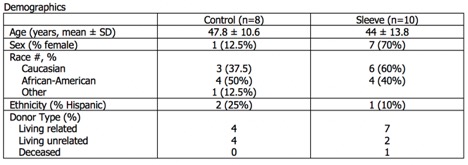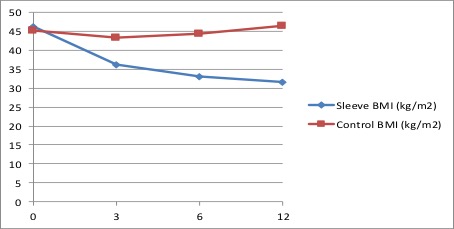Simultaneous Robotic Kidney Transplantation and Bariatric Surgery for Morbidly Obese Patients with End-Stage Renal Failure
University of Illinois at Chicago, Chicago, IL
Meeting: 2019 American Transplant Congress
Abstract number: 37
Keywords: Kidney transplantation, Obesity, Surgical complications
Session Information
Session Name: Concurrent Session: Kidney Technical
Session Type: Concurrent Session
Date: Sunday, June 2, 2019
Session Time: 2:30pm-4:00pm
 Presentation Time: 3:18pm-3:30pm
Presentation Time: 3:18pm-3:30pm
Location: Room 304
*Purpose: The purpose of this study is to evaluate the safety and efficacy of simultaneous robotic assisted kidney transplant and robotic assisted sleeve in obese patients with end stage renal disease compared to kidney transplant alone.
*Methods: A single center, open label, prospective, randomized controlled trial comparing robotic kidney transplant in combination with sleeve gastrectomy to robotic kidney transplant alone was performed. Kidney transplant recipients with a BMI 35 kg/m2 or greater are eligible for inclusion. Surgical complications, and medical outcomes were documented.
*Results: This is a preliminary analysis of the first 18 randomized subjects following transplant, as 1-year follow-up data is not available in all participants. Changes in weight and BMI are presented in table 1. The GFR after 1 year was lower in the sleeve arm compared to the control arm (51 vs 62 ml/min, p=0.16). Overall, operative time was longer (3.5 vs 4.8 hours, p<0.05) for the sleeve arm but the warm ischemia time was comparable among the two groups (50.4+13.5 vs 51.6+15.7, p=0.92). In the sleeve arm, one patient required a conversion due to poor perfusion to the kidney allograft and another had a small bowel obstruction while the control arm had a patient have a laceration and thrombus in the allograft kidney successfully treated and reimplanted at the same time of the original transplant (Clavien Dindo Class IIIa or greater). Although, length of stay was longer in the sleeve arm (8.2+3.3 vs 6.6+3.7, p=0.28) it was not significant.
*Conclusions: The combination of simultaneous kidney transplant and sleeve gastrectomy in obese end-stage renal disease patients is safe and results in significant weight loss and a numerically higher GFR. It appears to be a feasible approach to address renal failure and obesity with a high likelihood of sustained graft outcomes.
To cite this abstract in AMA style:
West-Thielke P, Tulla KA, Okoye OT, Alvarez JAAlmario, Spaggiari M, Tzvetanov IG, Benedetti E. Simultaneous Robotic Kidney Transplantation and Bariatric Surgery for Morbidly Obese Patients with End-Stage Renal Failure [abstract]. Am J Transplant. 2019; 19 (suppl 3). https://atcmeetingabstracts.com/abstract/simultaneous-robotic-kidney-transplantation-and-bariatric-surgery-for-morbidly-obese-patients-with-end-stage-renal-failure/. Accessed February 28, 2026.« Back to 2019 American Transplant Congress



